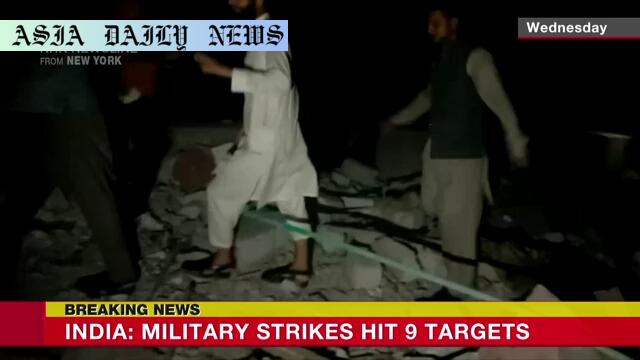Terrorist Infrastructure – India says it has launched military strikes on nine sites in Pakistan and Pakistan-administered Kashmir.

India’s Strikes on Terrorist Infrastructure: A Bold Move
In a significant military operation, India announced its strikes on nine locations within Pakistan and Pakistan-administered Kashmir on Wednesday. These strikes reportedly aimed at what the Indian defense ministry termed ‘terrorist infrastructure,’ facilities deemed instrumental in orchestrating attacks on Indian soil. This decisive move comes in the wake of heightened tensions following last month’s tragic terrorist attack in Indian-controlled Kashmir, which claimed the lives of 26 individuals, many of them tourists. The action signifies a marked escalation in the already tense relations between the two neighboring nations.
Understanding the Geopolitical Context
This development cannot be studied in isolation from the broader geopolitical dynamics at play. India has accused Pakistan of harboring and supporting various terrorist groups over the years, allegations that Pakistan has repeatedly denied. The attack in Indian-controlled Kashmir served as a tipping point for India, with its government signaling potential countermeasures shortly after the incident. Through Wednesday’s strikes, India has underscored a shift from diplomatic contention to more enforceable actions perceived as protective measures against perceived threats emanating from across the border.
Pakistan’s Response and Implications
Pakistan, on the other hand, has categorically denied any communication linking its state apparatus to the Kashmir attack. Moreover, the Pakistani military’s spokesperson revealed that missile attacks on three locations within their territory had been initiated by India. Islamabad has condemned these actions and accused India of jeopardizing regional peace. Such actions, from both parties, serve to exacerbate tensions, posing risks not just to the two nations but potentially destabilizing the wider South Asian region.
The Broader Impact on Indo-Pak Relations
The strikes, while aimed at eradicating what India calls ‘terrorist infrastructure,’ appear to have revived fears of a broader conflict. Both nations have historically struggled with deep-rooted animosities tied to territorial claims, with Kashmir being a long-standing flashpoint. The international community is likely to keep a close eye on these developments, urging restraint while potentially mediating for de-escalation. Pakistan has called for discussions to address this direct aggression, signaling the possibility of diplomatic engagement amidst such turbulent circumstances.
Commentary
The Importance of Addressing Cross-Border Conflict
The strikes conducted by India represent a significant escalation in addressing what the nation perceives as imminent threats. While the decision to act militarily may be controversial, it sheds light on the frustrations India has faced in attempts to diplomatically resolve its concerns regarding terror activity. This choice also raises critical discussions about sovereignty, cross-border responsibility, and the strategies adopted to combat terrorism on a global scale. One cannot ignore the cyclical nature of such hostilities and the urgent need for lasting resolution methods.
Pakistan’s Position and International Implications
Pakistan’s condemnation of these strikes is not unexpected, given its consistent denial of involvement in terrorism. However, the very nature of the accusations against Pakistan brings to the fore international accountability measures. If Pakistan had no hand in the Kashmir attack, it is in its interest to clear its name on such a significant charge. The strikes by India, though unilateral, worsen the perception of Pakistan in the eyes of other nations. Global efforts to mediate such disputes can clarify responsibilities, reduce miscommunication, and prevent such drastic measures in the future.
Global Reactions and Peacemaking Efforts
What remains critical in the aftermath of these strikes is the global reaction and the UN’s role in managing conflicts between nuclear-armed neighbors. Multi-national organizations must work towards brokering long-term peace instead of allowing for scenarios where militaristic responses become the norm. A resolution would require not only transparency from both nations but also active involvement from allies and strategic players globally. Moving beyond reactionary measures to systematic and robust approaches could be key to reducing tensions in this region and ensuring infrastructural stability for both nations.


